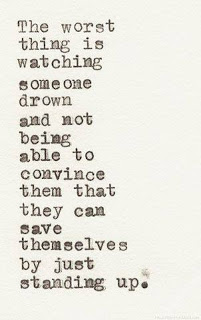
A piece of jargon that gets gets wrong (wrongly?) is “trigger warning.” Triggers are things that remind the nervous system of a negative past event. The system responds as if the bad thing is happening, and this can be confusing, because the logical and rational mind knows the bad thing is not happening, but the subconscious part says “similar is same” and responds. This happens to protect us from further harm.
It is impossible to warn that something is a trigger as one has no idea what will trigger a person if they have not disclosed their triggers. A trigger can be a scene, like rape or war, or someone’s appearance, the way the light hits an object, the way a person moves, speaks, holds their head, or walks. These triggers may be unknown even to the triggered person because it’s happening that deeply.
Content, by contrast, is a scene that may be a trigger to big groups of people, like war or rape, violence, gore, vehicular crashes, or animal cruelty. So content can be triggering, but is not necessarily so.
I like that people use content warnings. I’m a person who likes horror movies, but I don’t like gore, animal cruelty, or gratuitous violence. None of these things, however, are trauma triggers to me; I just dislike them. I like that people are trying to do well by others by labeling things with warnings and I appreciate the efforts. I do, however, want to provide some additional education that you’re not doing the thing you intend with that particular label.
TL;DR: Trigger warnings are impractical, but content warnings are useful.
Autumn Hahn is a Licensed Mental Health Counselor and Certified Clinical Hypnotherapist practicing at Clear Mind Group in Florida, Georgia, Nevada, New York, and Virginia. Call 954-612-9553 for a consultation. Follow Autumn on Twitter & Facebook.





 This post is intentionally controversial. Rather, this post asserts my position firmly and you’re welcome to disagree with me.
This post is intentionally controversial. Rather, this post asserts my position firmly and you’re welcome to disagree with me.
 For me, the worst thing about being a therapist is seeing people in pain who are not yet willing or ready to make a change. This includes people who resonate with the following statements:
For me, the worst thing about being a therapist is seeing people in pain who are not yet willing or ready to make a change. This includes people who resonate with the following statements:
 I was never diagnosed with Sensory Processing Disorder (SPD) as a child. Although Sensory Integration Dysfunction (it’s predecessor) was coined in 1972, I didn’t learn about it until 2013, while having dinner with two colleagues who work with children. Upon hearing about the symptoms, I identified with many of them, asked my colleagues many questions, and took a quiz to self-diagnose. Fascinating stuff. It explained many things about my childhood and adult life.
I was never diagnosed with Sensory Processing Disorder (SPD) as a child. Although Sensory Integration Dysfunction (it’s predecessor) was coined in 1972, I didn’t learn about it until 2013, while having dinner with two colleagues who work with children. Upon hearing about the symptoms, I identified with many of them, asked my colleagues many questions, and took a quiz to self-diagnose. Fascinating stuff. It explained many things about my childhood and adult life.